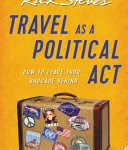Everyone knows who Rick Steves is—the nerdy travel guy who goes all over Europe. He’s got a travel TV show. Many of you have followed his advice for trips. He has updated an unusual type of travel book called, Travel as a Political Act.
This is a traditional travel advice book but is also a strong statement of Rick Steves’ opinions. He starts with a premise that he made in the first edition. The value of traveling is to make the traveler see his world in a different way. And, hopefully, that new vision will cause the traveler to change in a positive way. It’s also a fascinating look at places that most of us will never get to.
Rick Steves travels to Iran. His first impression is a heavy, oppressive culture. He’s not scared, but feels the weight of the theocracy dictating almost everything in the country. Then, Rick Steves begins to talk with the people. He finds them warm, funny, and anxious to talk with him. Many of them say, “We like Americans.” He concludes that our two nations misunderstand each other in many ways. And since Americans don’t know much about Iranians, there is the risk of a violent clash because of our ignorance. Traveling, Rick Steves maintains, reduces that risk because we get to know other people and how they live. Which, it turns out, is much like us in many ways.
He also investigates the drug policies of some of the European countries. Many of them are quite different from us. For instance, Denmark has chosen to treat the drug problem as a public health issue. The U.S. chose to criminalize it. The percentage of drug us and related crime in Europe is no worse than here. And that’s in spite of the fact marijuana is sold legally in special shops. But Denmark spends a fraction of what we spend on the same problem. Instead, they spend it on repairing roads, and building hospitals and schools. 
Rick Steves launches into the main issue he wants us to understand. By traveling, we learn what other people around the world are doing to solve the same problems we have here. Maybe we could consider those solutions to improve our situation.
Readers may think he is simply a left-wing advocate. Not true. He emphasizes that he loves America and runs a business here. He is a capitalist who believes that many answers can be learned by traveling and experiencing other people.
Finally, he challenges all of us to do something. Rick Steves suggests we pick something that interests us: poverty, hunger, housing, drug policies, or the effect of U.S. trade policy around the world. Travelers who see, up close and personal, these issues around the world, have a great opportunity to act.
Get the book and read it.






